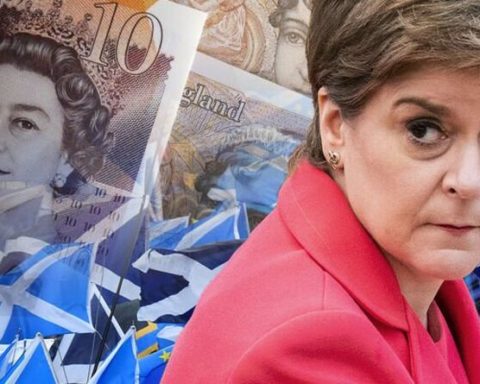Alex Salmond warns of ‘international action’ for independence
In a hammer blow to the SNP’s independence plans, a report from the Institute for Fiscal Studies (IFS) claims Scottish Government funding is 30 percent higher than in England because of the Barnett formula. A total of £1.30 per person is spent on public services in Scotland for every £1 South of the border.
The study says almost all of this gap, 28.9p out of the overall 30.6p, is due to “relatively high levels of funding from the UK Government via the Barnett formula.”
Meanwhile, net revenues from the Scottish Government’s devolved taxes make only a marginal 1.7p out of the 30.6p.
The think tank claims the small contribution by the Scottish government was because the SNP led administration had performed “relatively poorly compared to the rest of the UK since the devolution of income tax powers”.
But they found the Scottish Government’s devolved taxes were contributing a modest but growing sum to its funding.

The IFS published a report as Scottish political leaders gathered for their first debate (Image: Getty)

The report was undertaken by the IFS (Image: Getty)
Plans suggest core funding will be about 3 percent higher in 2021-22 than in 2010, but population growth means this is around 2 percent lower per person.
In the report, the IFS also claimed the Scottish Government had chosen to use some of its temporary coronavirus funding to pay for permanent spending commitments.
An IFS briefing note said the SNP led administration had received an additional £9.5billion from the UK Government in Covid-related funding, basing their figures from the Scottish Fiscal Commission.
But the report stressed not all of the extra funding was going to Covid-related spending, with some being used to extend free school meals and free bus travel.
READ MORE: Nicola Sturgeon SNUBS UK Government in Christmas card farce

The UK Treasury has allocated the Scottish Government over £14 billion in additional funding (Image: Getty)
It warned that these commitments would have to be funded from the core budget in 2022/23 and beyond, where money is likely to be “tight”.
About two-thirds of Scottish Government funding comes from the block grant it receives from the UK Government, but Scottish income tax will contribute 27 percent and other Scottish taxes 5.5 percent, with borrowing contributing the remaining 0.5 percent.
The UK Treasury has allocated the Scottish Government over £14billion in additional funding through the Barnett formula since the start of the pandemic.
This is on top of the block grant and in addition to extensive direct UK Government support to people and businesses in Scotland.
DON’T MISS:
Sir John Major attacked by No10 in Scot independence vote row [LATEST]
Alex Salmond’s ‘game’ plot is ‘greatest threat UK has ever faced’ [REVEAL]
Nicola Sturgeon shamed for ‘worthless promises’ [INSIGHT]

Scottish Finance Secretary Kate Forbes said devolved tax policies had delivered “certainty” (Image: Getty)
The Scottish Government had received an additional £9.7billion from the UK Government in COVID-related funding alone in 2021/22.
David Phillips, associate director at the IFS and author of the report said: “Excluding temporary COVID-19 funding, the Scottish Government has over £1.30 per person to spend on public services this year for every £1 of spending per person on comparable services in England.
“This is almost entirely due to funding received from the UK Government via the Barnett formula, with less than 2p of the gap due to the Scottish Government’s borrowing and higher income taxes.
“Indeed, the relatively weak performance of the Scottish economy means that the net revenues received from income tax have only increased slightly, despite tax increases in Scotland.
“They would have fallen relative to a world without tax devolution had those tax rises not been implemented, reminding us that devolution brings risks as well as opportunities.”
He continued: “Likely tight spending plans in Westminster could mean the next Holyrood administration will have to consider tax increases or cuts to some services – not least to pay for long-term policies on free school meals, public transport, council tax and mental health services, that this year will be paid for using temporary COVID-19 funding.”
Scotland ‘worse off’ with independence says Alister Jack
Pamela Nash, chief executive of Scotland in Union, said the report was “confirmation that Scotland is stronger in the UK.”
She added: “All parts of the UK pool resources and share according to need, meaning we can spend more on our NHS, schools and other public services.
“Rather than obsess about the timing of another referendum, it’s time for some honesty from Nicola Sturgeon about how a separate Scotland would address the immediate gap between spending and revenue – how much would she raise taxes by and how much would she cut from schools and hospitals?
“But it would be preferable if she would drop her campaign to divide Scotland and instead focus on bringing people together as we recover from Covid.”
Maurice Golden, Scottish Conservative economy spokesman, said: “This analysis makes it clear that Scotland’s place in the United Kingdom is going to be essential for our economic recovery to succeed after the coronavirus.
“The extra money Scotland gets through the Barnett formula in the months and years ahead will be key to saving jobs, supporting businesses, growing the economy and offering high-quality workforce training.
“There is a risk though, the SNP’s divisive and unnecessary plan to hold another independence referendum this year would place a stake through the heart of Scotland’s economic recovery.”

Maurice Golden, Scottish Tories Finance spokesman (Image: Getty)
Daniel Johnson, Scottish Labour finance spokesperson said: “This calls into question the real motivation behind the SNP’s dismissal of Labour budget demands. We were told fair pay for care workers could only be met through recurring funds, not emergency COVID money.
“If temporary COVID funds are in fact being used for permanent spending commitments, what excuse does the SNP have for Scotland’s heroic social care workers being denied fair pay, and what do they say to those individuals and businesses who have had no or inadequate Covid support?
“We need action now not excuses. We need a recovery plan that restores and grows our economy, rather than budget fiddles to deliver election reveals. Businesses need help now, not the delays in support from the SNP”
In response to the report, Finance Secretary Kate Forbes said it highlighted a decade of “unrelenting” austerity from the Conservatives, adding that devolved taxes would raise more than £500 million this year.
She said: “While the Barnett formula does provide Scotland with slightly higher public spending per head than in England, it is already under attack by the Tories at Westminster, who have cut our capital budget by 5% and stripped the Scottish Parliament of powers so they can engage in ‘pork-barrel’ spending through the so-called levelling up fund.
“Scotland’s funding will never be safe under a prime minister who famously said that a pound spent in Croydon is better than a pound spent in Strathclyde.
“An independent Scotland would be able to make different choices, and give us all the economic levers needed to grow our economy and to make the public spending choices best suited to Scotland’s interests – such as not spending hundreds of billions of pounds on the Trident missile programme.
“Almost all independent countries operate a deficit and manage a debt – indeed the UK currently has a national debt in excess of £2 trillion.”




